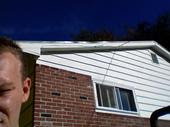
Playing catch-up, so commentary will be spotty. And saving chapbooks for another occasion.
Peter Gizzi, Some Values of Landscape and Weather. For the third or fourth time.
Robert Duncan, Letters. For the second time. Beautiful Flood Editions reprint.
Giorgio Agamben, State of Exception.
Michael O'Brien, Sleeping and Waking.
From "Another Autumn":
the brick of meaning, the brick of money, you want to muss up their hairif he says Do not hasten to bid me adieu he's not a cowboy
And from "Ghosts":
HighwaysignWrapped inburlapIt meansNothing
Robert Duncan, The Opening of the Field. For maybe the third time.
From "After Reading Barely and Widely":
Poetry, that must touch the stringfor music's serviceis of violence and obedience a delicate balancing.
And from "The inbinding mirrors a process . . .":
My heart despairs. For the poembeyond all poetry I have actually heardhas words as natural and expendableas a cold stream of the first waterthru which rocks of my resistant lifeyield to light cleavages of what seems true,white heights and green deeps.
And from "The Structure of Rime XII":
The structure of rime is in the rigorous trees repeated that take on the swirl visible in the coast winds and the outcroppings, the upraised and bared granites that define sentences of force and instrument.
Jennifer Bartlett, Derivative of the Moving Image.
Hannah Arendt, The Human Condition. I can't stop puzzling over her very peculiar version of what politics is—or rather was, since she more or less restricts the phenomenon to classical Athens and directly opposes it to any socioeconomic, legislative modern activity. "Politics" means showing off, goofing off, making speeches, making sure you get stories told about you after you die, but not necessarily changing anything. The closest I think I've come in my own experience were at a hippie summer camp in my early teens, and at various summer-camp-like indie-rock fests. I've never been to a poetry conference, but I suspect it's the same vibe. I'm not quite comfortable with these examples, or with Arendt's nostalgia, but her politics of self-revelation do very helpful to me for thinking about Agamben's deal with the politics of gesture, and various poets' stated desire to make cities with their poems (Olson, Blaser, Spicer, Oppen.)Still puzzling.
Michael Palmer, First Figure.
Eléna Rivera, Unknowne Land.
Robert Kelly, Her Body Against Time.
Michael Palmer, Notes for Echo Lake. For the second time.
"Alogon" (5):
These feelingsare imaginary.These feelingsare imagesof things.These thingsare feltas real.These thingsare imaginedas real,"head andneck, faceand eyes,arms, fingers,nipples andhips." Theseimaginings containno ideas.
David Rattray, Opening the Eyelid. This guy was amazing! I'm very grateful to David Abel for giving me a copy of this book, which he published in 1990 when Rattray was still alive (and working for Reader's Digest!).
From "A Division of Water":
The hebrew word araphel means"thick darkness, secret or high place."But there is no such thing as obscurepoetry. The objects of a poemare as bright and clear as can be.The boast that itswords come from the heartis true of each real poem, eachword written in blood.Who wants to look at a colorso bright it hurts the eyes?With an elevated serum nitrogen levelat above 12,000 feet,Tibet favors a mix ofbright reds and yellows.Red stands for raging energy,yellow for light.. . .On the Williamsburgat 1:15 of an afternoon on Sunday,April 17th, a sunny day,60 degrees with a light breeze,I counted fourteen flattenedPrince's Plastic Weld glue tubes;two syringes, one withand one without a point;countless broken pints, Smirnoff, Ron Rico, etc.;plus an intact Wild Irish Rose empty.
Michael Palmer, Active Boundaries: Selected Essays and Talks.
Michael Palmer, Sun. For the second time.
John Cowper Powys, A Glastonbury Romance.
And the voice replied to him again and it was now so low and yet so searching that it was like a wind stirring the horns of snails and touching the hairs on the throats of night-jars, and moving the antennae of butterflies, and lifting the gold-dust from the cracks of puff-balls, and blowing the grey dust from the droppings of weasels, and rippling the brown rain-fall in the cups of fungi, and fretting the light scurf on the brittle skulls of the newborn, and the rheum-drops on the eyelids of extreme age, and the sweat-drops on the forehead of death.
The man knew his way around a hyphen. I was pleased to carry this dark blue brick around all summer for sentences like that.


1 comment:
Cups of fungi! Sold. I'm making my way to Powell's this weekend.
Post a Comment